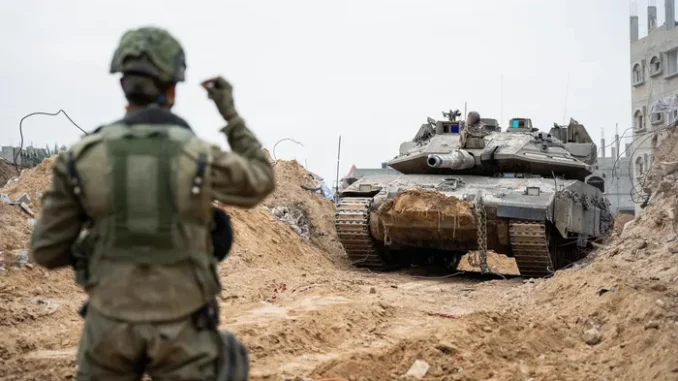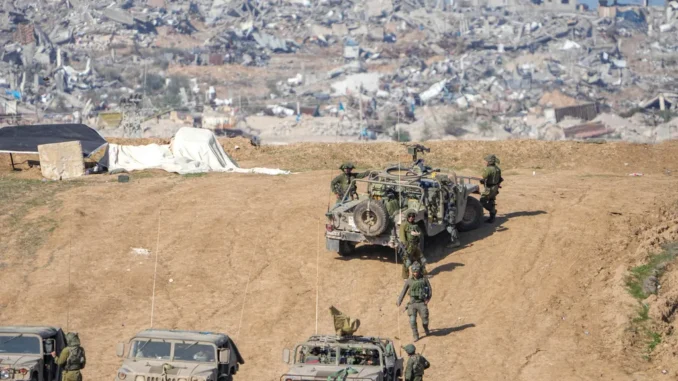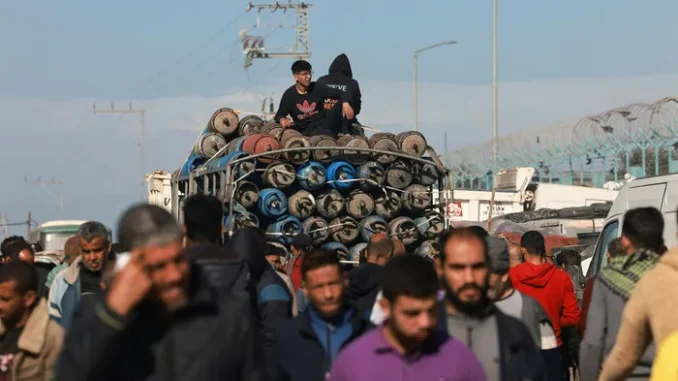As long as aid gets into Gaza, and as long as Israel is killing fewer civilians, the U.S. is in less of a hurry when it comes to Israel moving toward a lower-intensity phase in the fighting and, eventually, withdrawing from Gaza? Cairo floats new hostage deal proposal
By Amos Harel, HAARETZ DEC 25/23

Israeli soldiers near the border with Gaza, on Saturday.Credit: Ariel Schalit / AP
Christmas has arrived and the IDF is still fighting on the ground in Gaza. The early forecasts in Washington, and to some extent in Jerusalem, were that the Biden administration would demand that Israel end the high-intensity phase of the ground offensive against Hamas by the close of the year, and that at most the Americans would agree to only a further few weeks of fighting in the current format.
In the meantime, the U.S. is on its Christmas-New Year vacation like the rest of the Western world, and the administration in Washington will be working on a limited basis over the next 10 days or so.
If nothing exceptional happens during this time, the Americans won’t ask Israel to stop. President Joe Biden hasn’t forgotten the war in Gaza and he is not indifferent to the suffering of the Palestinians in Gaza. But the deal that is cooking between the U.S. president and Prime Minister Benjamin Netanyahu could allow Israel more time in the current phase of fighting.
Over the weekend, the U.S. shot down a UN Security Council resolution sponsored by the United Arab Emirates and Egypt calling for an immediate cease-fire between Israel and Hamas.
In exchange for the veto, Netanyahu acquiesced to the American demand that Israel allow large quantities of humanitarian aid into the Strip. The humanitarian crisis in Gaza remains very grave, but the increased aid ensured by the Americans has for the moment ensured that it doesn’t deteriorate into an outright humanitarian catastrophe.

Israeli tank operating in the Gaza Strip, earlier this week.Credit: IDF Spokesperson’s Unit
The deal between Biden and Netanyahu is as follows: The president, who in any event morally endorses the Israeli response to the events of October 7 and supports the elimination of Hamas, delays a cease-fire.
The prime minister promises that humanitarian aid is allowed into Gaza, including through the Kerem Shalom crossing (this is to ensure that the aid goes through security checks, but is in complete contradiction to the government’s statements following the massacre that no aid would be allowed through the crossings).
As long as aid gets into Gaza, and as long as Israel is killing fewer civilians, the U.S. is in less of a hurry when it comes to Israel moving toward a lower-intensity phase in the fighting and, gradually, toward withdrawing from parts of Gaza and conducting raids.
There are two weak points in this emerging agreement. First, the humanitarian aid also helps Hamas.

Empty gas containers collected in Rafah, on Saturday.Credit: Mohammed Abed
Not only does the aid reduce the pressure on the Hamas regime from the civilian population, it is also clear that a large part of the aid brought into Gaza is plundered by Hamas; the fuel keeps the ventilation systems in Hamas’ tunnels up and running, and the food aid increases the already large supplies that Hamas holds for its own people. Secondly, it isn’t at all clear whether a delay in moving to a lower-intensity phase serves Israel’s interests.
Questions have also been raised over whether the slow, methodical search for tunnel shafts and weapons depots is bringing Israel any closer to the declared goal of the campaign: dismantling Hamas’s capabilities and creating the conditions for the return of the hostages.
Netanyahu, meanwhile, continues to convey to the Israeli public a somewhat misleading picture, as if the IDF is racing to victory in the Gaza Strip without any restrictions.
On Sunday, in two separate appearances, he promised that Israel would continue to fight Hamas “until total victory,” without addressing the debate over the nature of the operation.
In contrast, the head of the General Staff’s strategic division, Maj. Gen. Eliezer Toledano, told ministers on Sunday: “This is a war that will continue for many more months. We will have to calculate our use of munitions. We spare no munitions in the maneuver and we do everything necessary to protect the lives of our soldiers.”
Toledano’s remarks came after Minister Nir Barkat expressed concern that Israel is “too nice,” that it is overly considerate of American demands to reduce the risks to Palestinian civilians and therefore reduces the intensity of its attacks in a way that endangers Israeli soldiers.
Barkat, who has suddenly dared to attack Netanyahu, albeit indirectly, is part of a wave of growing complaints from the ultra-right wing of the government against the way the war is being waged. This, too, is part of the trap the prime minister finds himself in due to the American expectations for a change in the way the war is being fought.
POSSIBLE HOSTAGE DEAL
Following a long period of silence in the Qatari-led negotiations for a new hostage deal, Egypt has also entered the picture. Cairo has suggested a new framework in which 40 hostages held in Gaza would be freed in the first stage.
This group would include the women still held, along with men over 60 and hostages who are sick or badly wounded. In exchange, Israel will have to agree to a cease-fire lasting a week or two.
Later the sides would discuss an all-for-all deal – all the hostages for all the Palestinian prisoners held by Israel – a full Israeli withdrawal from Gaza, a long-term cease-fire and the establishment of a technocratic government in the Strip comprised of members who have no affiliation with Hamas.
The Qatari track however is stuck and unlike the regime in Doha, Cairo is able to maintain (almost) direct contact with the Hamas leadership in Gaza, which is hiding out underground. The Qataris as mediators require the mediation of the senior Hamas leadership that has been in the country for years.
Israel’s skepticism of the Egyptian proposal results from the impression that after the first stage, Cairo is trying to impose on Israel an end to the war without Hamas being dismantled, and to have the organization at least partially involved in the new regime in the Strip.



And as long as IDF soldiers die disproportionately protecting Gazan “civilians” then Biden is OK with the war Israel is fighting.
Peacemakers like Sisi of the Muslim Brotherhood, or Abbas of the PLA, or Qatar where the 3 billionaire leaders of Hamas live in luxurious hotels are not honest brokers and everyone of them hates Jews and Israel including Biden and Obama,
There can never be peace and from the first Arabs attack in 1948 to this last atrocity on October 7th, and despite every concession and death that Israel has suffered from 1948, a hating UN and terrible presidents like Jimmy Carter, Obama and now Biden, there is only one truth.
Israel will never live in peace with these animals and Europe and America are in great danger of becoming Muslim dominant.
SOLUTION? I WISH I HAD ONE. THE ARABS DO; THEY WANT TO DESTROY ISRAEL AND ALL THE JEWS IN THE WORLD AND THE JEWS DO NOTHING, AS THEY DID IN THE HOLOCAUST. THEY COULD HAVE STOPPED HITLER AND THE OTHER TYRANTS BEFORE, NOT AFTER.
A moot point. both Israel and Hamas refused. and
“On Sunday a Hamas police officer shot dead a Gazan youth who was part of a group of civilians who stopped an aid truck trying to deliver packages.”
Ynet news